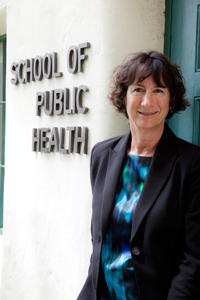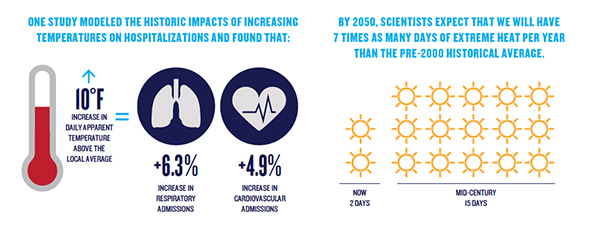Science
More extended heat waves and less nighttime cooling will put our health at risk.
The science and why it matters:
- Our elderly, children, low-income residents and the chronically ill are at highest risk from the health impacts of climate change.
- Extreme high temperatures and extended heat waves have historically caused heat-related illness and death and may do so more frequently.
- While air quality across the San Diego region has improved since the ‘70s and ‘80s,1 future poor air quality from wildfires and days of high ozone pollution will increase respiratory and cardiac health problems for people with respiratory and chronic illness.
- Warming temperatures and wildfires are already affecting the populations and prevalence of rodents, mosquitos and other animals that carry and spread disease, potentially exposing San Diegans to more infectious diseases.
A word from the scientists
"With more extreme weather, we will see an increase in childhood asthma, infectious diseases and heat-induced heart failure. Our children and grandparents, as well as the chronically ill and people with lower incomes, will be most vulnerable."
Jenny Quintana, PhD
Associate Professor, Division of Environmental Health, San Diego State University


Health and extreme heat
One study2 modeled the historic impacts of increasing temperatures on hospitalizations. For daily apparent temperatures 10°F above the local average, the study found:
- +6.3% increase in respiratory admissions
- +4.9% increase in cardiovascular admissions
By 2050, scientists expect that we will have 7 times as many days of extreme heat per year than the pre-2000 historical average.3 Currently we see 2 days of extreme heat a year. We expect 15 extreme heat days a year in the middle of this century.
1. This improvement in air quality has been largely attributed to the Clean Air Act of 1970 as well as advances in technology, namely the catalytic converter.
2. Ostro, B., Rauch, S., Green, R., Malig, B., & Basu, R. 2010. The Effects of Temperature and Use of Air Conditioning on Hospitalizations. American Journal of Epidemiology. DOI: 10.1093/aje/kwq231
3. Higbee, Melissa, Daniel Cayan, Sam Iacobellis, Mary Tyree. 2014. Report from San Diego Hazard Mitigation Plan Update Training Workshop #1: Climate Change and Hazards in San Diego. ICLEI-Local Governments for Sustainability.
